Main Menu
Latest Blog Entry
User login
The best sports nutrition supplement is…
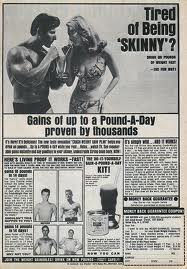
All about sex appeal
“How can we make more money from impressionable teenage boys?”
Is a question equipment manufacturers in the 1950s asked. Today, sports supplement companies make a fortune by selling products that promise short cuts and quick gains to young males with low self- esteem.
Tony Caldwell has been training in powerlifting and bodybuilding for 50 years, here he gives his thoughts on supplementation.
The first sports supplements
I have been involved in lifting weights for almost 50 years as a rugby player, powerlifter and bodybuilder.

Cigarettes and golf
During that time I have seen massive changes in the field of nutrition for athletes from the beer and potatoes regime of the early strongmen (before my time I might add) to the supercharged (and super priced) products of today as touted in just about every sports magazine in circulation.
First a little history. Back in the 1950s in the USA strength sports such as Olympic lifting, powerlifting and especially bodybuilding were in their infancy. There were two major companies producing weight training equipment: the York Barbell Co. from York PA and the Weider organisation based at that time in New Jersey. Both sold barbells, dumbbells, benches etc through the magazines they published, York’s “Strength & Health” and Weider’s “Mr America” .
Fairly early on both companies realised that not only did they not get many repeat orders for weight sets but the shipping costs for the ones that they did sell were high, thus cutting down the profit margins.
Then someone came up with the bright idea of food supplements, initially protein. These products were cheap to manufacture, usually being a mixture of skim milk powder and soy (yummy!) and could be sold at a greatly inflated price thus increasing company profits overnight.
They were then advertised in the magazines endorsed by either a top lifter or champion bodybuilder and given names like “Hi-Proteen” and Energol which was just overpriced wheat germ oil (York) and Weider’s Hi Protein (note the subtle spelling?)
Pumping Iron and steroids
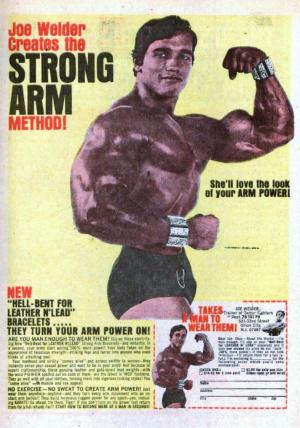
Arnie
In the 60s and 70s the hype and advertising,not to mention the proliferation of new and more outrageously named products exploded to the point where no self respecting strength athlete would take in any less than 300 gms of protein per day.
Naturally this did not produce a whole generation of people who looked like Arnold Schwarzenegger or could press double bodyweight overhead.
The superbly developed athletes in the magazines achieved this look and power not by ingesting vast amounts of “Crash Weight Gain #7” but by taking copious quantities of anabolic steroids.
Until the late 1960s these were quite legal in the USA, although obviously banned by all the major sports and their governing bodies.
Today we have more supplement companies than Bob Hoffman the founder of York Barbell Co. or Joe Weider could ever possibly have envisaged. They sell products ranging from pretty effective to downright worthless but all expensive.
How to get strong through eating
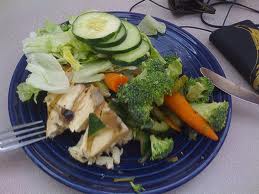
Real food wins
The first requisite when planning an athlete’s nutrition programme is to initially discount supplements and concentrate primarily on real food.
This should feature the correct ratios of protein, carbohydrates and fats obtained from natural sources lean meats, eggs, dairy, fresh fruit and vegetables and whole grains. The athlete’s current goals need to be considered when planning a personalised eating regime.
US strength coach Dan John has a simplified approach to eating, namely eat protein at every meal, eat vegetables and take fish oils. This is a pretty good point at which to start (I have pointed out to Dan that it is the oily fish, rather than the fish oils that provide health benefits, see British Medical Journal review here James).
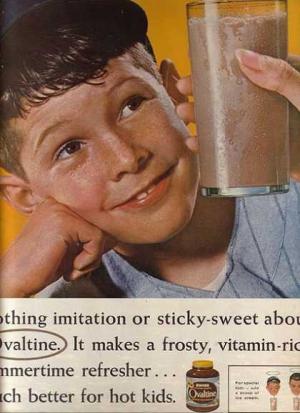
Ovaltine
If you feel extra protein is needed then before purchasing look at the ingredients, sometimes unwelcome extra sugars are added in order to improve the taste although there are several brands which are both pleasant to take and don’t contain anything you don’t want.
Personally I do take a whey protein shake after training plus I use a multi- vitamin and mineral supplement formulated for men. hey I’m 67 I need all the help I can get. This turns my urine a pleasant shade of bright yellow. I also use fish oils which I buy by the bucket load online from a company called Myprotein.
What about creatine or testosterone boosters?
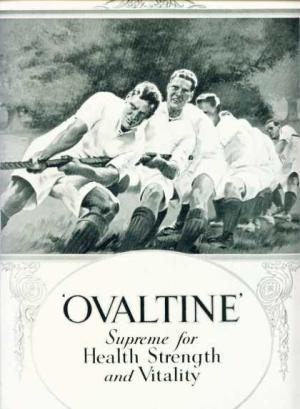 Apart from protein the one supplement I have found to definitely give noticeable results is creatine.
Apart from protein the one supplement I have found to definitely give noticeable results is creatine.
Taken as directed over a 6 week cycle should result in improvements in strength and muscle size providing the training stimulus is intensive enough to trigger a positive reaction.
There are minimal side effects to longer periods of use but it appears that after about 6 weeks the effects seem to diminish so probably 2 cycles per year would be the optimum programme.
Another area of interest is the large array of so called testosterone enhancers or boosters. I personally have tried a number of these and have found them to be largely ineffective.
These products tend to contain ingredients such as Tribulus, Fenugreek or Tongkat Ali, but usually in not enough quantity to have much effect. The main worry for athletes is that there exists a distinct possibility that a positive drug test could result from usage of these supplements.
They are often touted, amongst other things as libido enhancers, however a 25 year old athlete who needs help in that area should probably see his doctor!
To recap by all means consider using supplements but remember by definition that is precisely what they are. They are no substitute for a well planned eating programme.
Give sports drinks companies more money by:
- taking a pre- workout energy bar
- sipping on a carb drink whilst training
- finishing with a high calorie protein and carbohydrate concoction at the conclusion of the workout
thus ingesting about 3 times the energy expended during the training session.
Summary
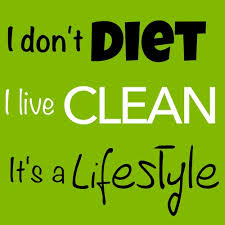 The final thing to remember before jumping in and purchasing the latest super duper product promising gains “beyond your wildest dreams” is that this stuff is usually very inexpensive to manufacture and will be sold at a large profit to a market targeting young impressionable athletes.
The final thing to remember before jumping in and purchasing the latest super duper product promising gains “beyond your wildest dreams” is that this stuff is usually very inexpensive to manufacture and will be sold at a large profit to a market targeting young impressionable athletes.
The only thing that will produce “steroid-like results” is a steroid. Leave ’em alone!!
My recommendation would be a good quality multi vitamin/mineral tablet and maybe whey protein. The bottom line though is EAT!!!
I hope that this information is of help to athletes and their coaches when putting together a nutrition plan.
Tony Caldwell
- Be aware of the high risk of contamination when taking supplements.
- Buy the Get stronger
James.
Client Testimonials
 Scott Rogers: Footballer
Scott Rogers: Footballer
I ruptured my ACL back in August 2015 playing football for Tiverton Town FC. Not only have I just returned to play again less than a year later with my knee feeling as good as it did prior to my injury, but my my body in the whole feels like it was 10 years ago […]
More


Comments
[…] The history of supplements: read how teenage gullible boys became the target market. […]
Thanks Tony. I met an athlete for the first time last week at 0800 who was carrying 2 sports nutrition drinks with him. I asked if he had had breakfast “yes- a yoghurt”.
Before wasting money on supplements that may or may not work you must get the fundamentals right.
Recent research has shown that breakfast is key to help set up the metabolism for the rest of the day, and even to prevent obesity. This means that your super low fat, low calorie yoghurt is useless in aiding sports performance.
A healthy balanced breakfast that contains protein, fat and carbohydrate is better.
Of course, that does mean getting up in time (so you have to go to bed earlier) to get your breakfast ready, and to plan your trip to the shops so that you have food in the house. Those things are not always the strong points of young athletes.